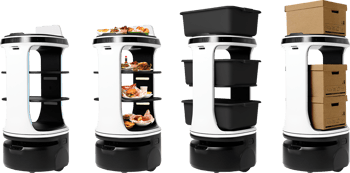The food truck sector has seen explosive growth over the last two decades. As restaurant owners and operators look for ways to improve their brand visibility, lower costs, and attract more customers, food trucks have become an extremely popular option.
With the help of mobile technology and social media, food trucks carved out a $1.8 billion segment of the U.S. economy in 2024.
Food trucks can serve as a point of entry for eager entrepreneurs looking to get a toehold in the restaurant business, but increasingly, established brick and mortar operations are also expanding into the mobile food business.
Either way, point of sale (POS) leader Toast predicts that the market will continue to grow in the coming years. But is it the right move for your cafe or catering business?
The answer will depend on a number of factors that are specific to your business. So before you make the leap into the food truck business, it’s a good idea to weigh the pros and cons of adding a food truck to your operation.
The Pros of Adding a Food Truck to Your Operation
Grandview Research projects that the food truck business will grow by a rate of 6.4 percent each year over the next half-decade, topping $2 billion in revenue by 2030. Clearly, the mobile food business is brimming with opportunity. Here are a few reasons why a food truck may be worth considering.
Meet Shifting Consumer Expectations
As millennial and Gen Z consumers have returned to work and public spaces after the pandemic, they have also powered a shift in dining preferences and expectations. Grandview says more than 60% of millennials prefer food trucks that serve unique or authentic food over traditional brick and mortar restaurants.
Increasingly, younger diners have sought out unique, adventurous, and niche food concepts. This has helped to fuel demand for food trucks catering to specialty diets, international cuisine, and quick-service gourmet options.
Expanding your business into the food truck space presents a chance to tap directly into the preferences and expectations of younger consumers.
Operate With Greater Agility
One of the biggest benefits of starting a food truck is the ability it gives you to operate more flexibly. Obviously, the fact that your business is mobile means you can move your entire operation from one location to another without experiencing any operational disruption. Your hours will also be more flexible as you respond to the amount of business you're doing in each spot.
The smaller scale of your operation also means you can be extremely flexible with your menu. Food trucks generally carry much smaller inventories than brick-and-mortar kitchens. A smaller inventory means you have more freedom to adjust your menu on the fly. You can diversify your offerings to attract new clientele, seize on food trends, or react quickly to changes in food costs.
Start Up Quickly and Affordably
If you’re considering a cafe or catering business expansion, ramping up the operation of a food truck is a lot more affordable than opening a second brick and mortar space. Grandview Research notes that the cost of opening a traditional restaurant is literally ten times the cost of starting a food truck.
Not only that, but you’ll get your new business off the ground a lot faster. Grandview says that it generally takes an average of 37 days to acquire the food truck permits required to open your service window. The average wait for brick-and-mortar restaurants is closer to three months.
This combination of speed and affordability is another reason for the continuing growth of the mobile food business.
Cut Your Operational Costs
While your food costs will generally be the same as they would in a brick-and-mortar location, you will save money in a number of other ways.
Whether you purchase your food truck outright or you pay a monthly fee to rent it, your spend will be far lower than a lease or mortgage on a new brick and mortar location.
The cost of labor is also a lot lower, particularly because you can only fit so many people into a food truck. Many food trucks are actually owner-operated, which means it’s pretty common for one of the people in that truck to be the head of the business. Beyond that, a food truck business can typically be operated with as few as two or three people.
Compare this to the combination of servers, chefs, dishwashers, and hosts/hostesses needed to operate a restaurant and it’s easy to see how opening a food truck could lower your labor costs.
The Cons of Adding a Food Truck to Your Operation
Despite these benefits, there are some challenges that are unique to the food truck business. It’s important to be aware of these factors before using a food truck to drive your cafe or catering business expansion.
Rising Costs
Like every other part of the hospitality industry, food trucks are grappling with rising costs for ingredients, gas, and vehicles. Grandview says the startup cost of a food truck is usually between $75,000 and $150,000. Toast says the cost can be as high as $250,000.
This compares favorably to the cost of opening a new brick and mortar restaurant, which Grandview estimates at between $275,000 and $2 million.
However, if you are thinking about a cafe or catering business expansion, you should be aware that food truck operators face many of the same external financial pressures as restaurant operators.
The price of entry into the business is increasing. And with labor costs and food prices also increasing, the day-to-day cost of food truck operation has also gone up over the last five years.
The major takeaway is that the food truck business is not a refuge from the rising costs that traditional restaurants face. It is simply an alternative business model with a lower barrier to entry.
Logistical Challenges
If you are new to the mobile food business, you’ll have to learn about a number of logistical factors that are unique to running a food truck.
For example, many food truck operators rely on commissaries or other rental spaces for food preparation, food storage, and equipment storage. This means that part of your daily procedure will include getting items from and returning items to this space.
Likewise, you have to account for the challenges and risks associated with mobile operation. Every municipality has its own rules and regulations about when and where you can operate, the type of permits you need, and what these permits will cost. Add to that the risks of dealing with traffic and the possibility of accidents that come with operating a mobile business.
You will need to navigate these rules and risks in order to get your food truck on the road. There is a learning curve in the food truck business, even for those who already have experience in the restaurant industry.
Increasing Competition From National Brands
While the food truck business has historically been dominated by independent operators, small businesses, and local markets, the proven popularity of food trucks now attracts participants of all shapes and sizes.
Today, national chains like Dunkin’ Donuts, Shake Shack, and Whataburger are heavily investing in their own food trucks. While opportunities abound, be aware that the competition is also growing stiffer in the mobile food business.
Expenses Specific to the Food Truck Business
If you’re new to the world of food trucks, you’ll need to account for some expenses that are unique to this space, including:
- Permits and licenses
- Parking and storage
- Generator and fuel
- Commissary, kitchen, or food storage space
And, if you’re starting from scratch, there’s also a lot that goes into readying your truck for food service, from electrical wiring and kitchen installation to fireproofing and plumbing.
You may be able to save on some of these startup costs by renting a truck that’s already been outfitted or purchasing a used food truck. Even then, though, you need to consider the cost of customizing the vehicle with your own branding and decor.
Specialized Vehicle Insurance
As a restaurant owner, you may be familiar with the insurance requirements associated with running a brick and mortar operation. You will need specialized vehicle insurance to run a food truck.
The food truck business opens you up to certain liabilities including accidents, traffic violations, and vehicle theft. Before making the transition into the mobile food business, make sure that you understand the vehicle insurance requirements in your state and municipality. You will need to factor both the costs and the process of obtaining coverage into your business plan.
How Technology Can Help You Start Up a Food Truck
One reason for the rapid expansion of the food truck business is the dramatic leap forward in restaurant technology. Today, mobile apps, cloud-based POS systems, and automated inventory management software make it possible to process orders, accept payments, and track sales data from anywhere.
This is a strong argument in favor of expanding into the food truck space. This technology makes it easier than ever before to integrate a mobile food operation with your existing accounting, ordering, and menu platforms. The same is true of the technology at your disposal for improving your social media presence.
Social media outlets like TikTok and Instagram are a vital part of creating visibility, buzz, and community engagement for food trucks. Fortunately, a growing array of social media support services now make it easier than ever to curate content, create engagement, and grow your online presence.
Not sure which of these tools are right for you? I’m here to help! Schedule your expert consultation today and we’ll figure out exactly what you need to get your mobile food business on the road.





